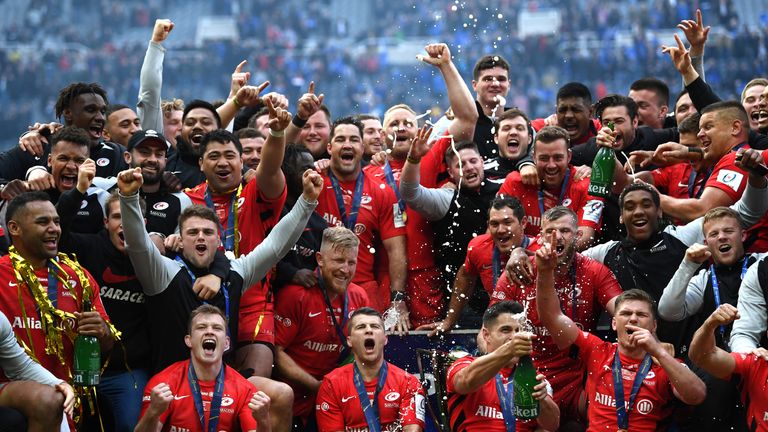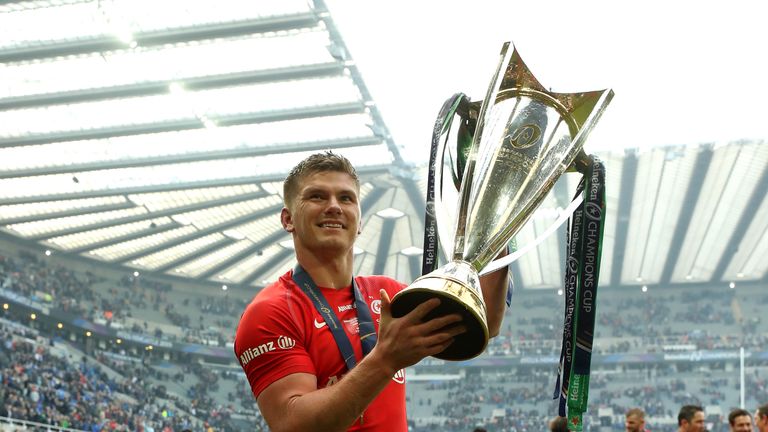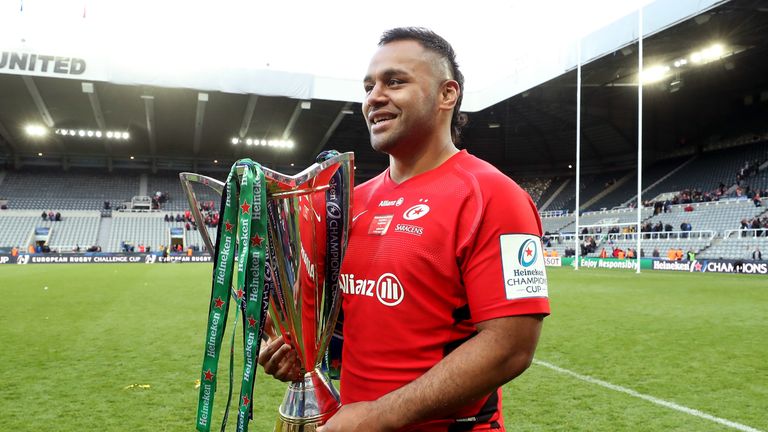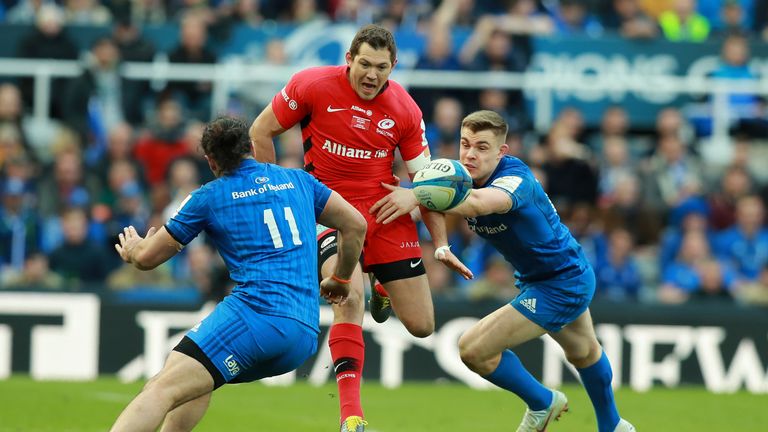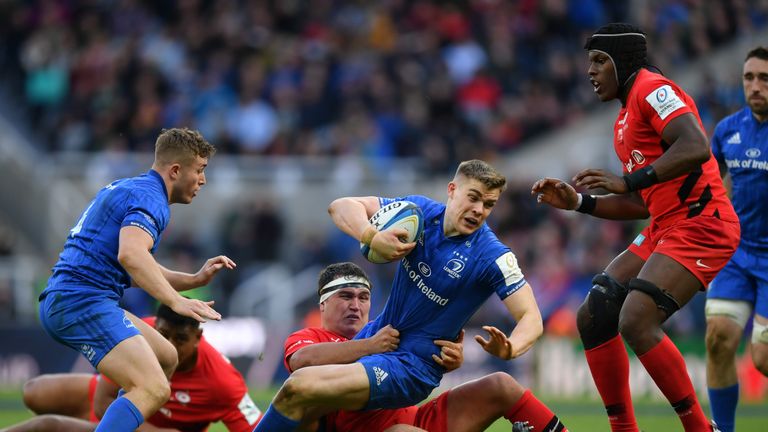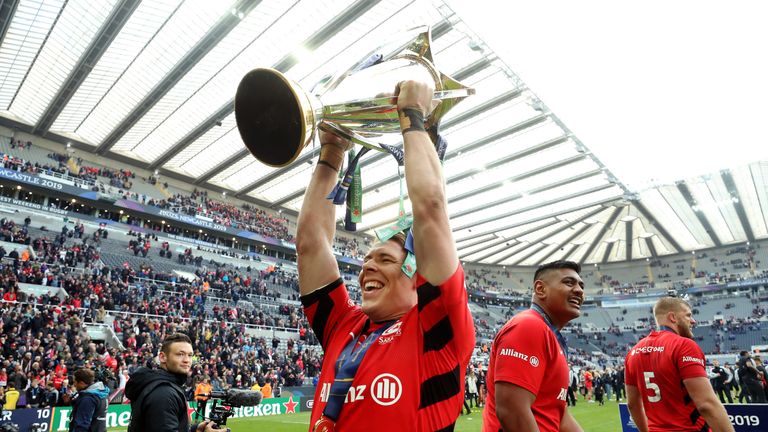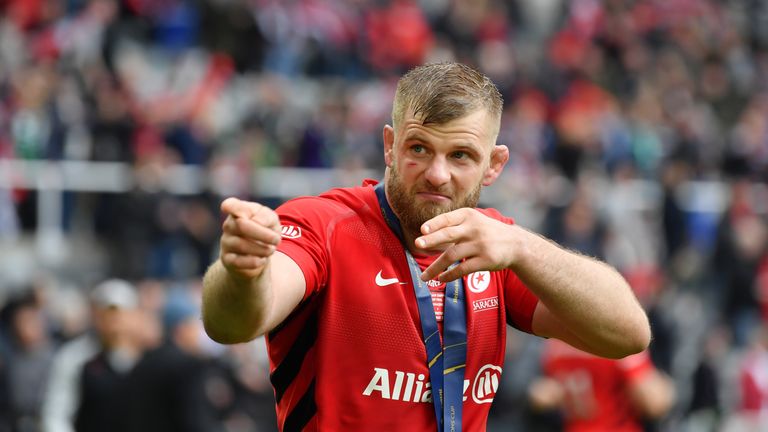How Saracens became European champions for a third time
Saracens beat Leinster 20-10 in the European Champions Cup final
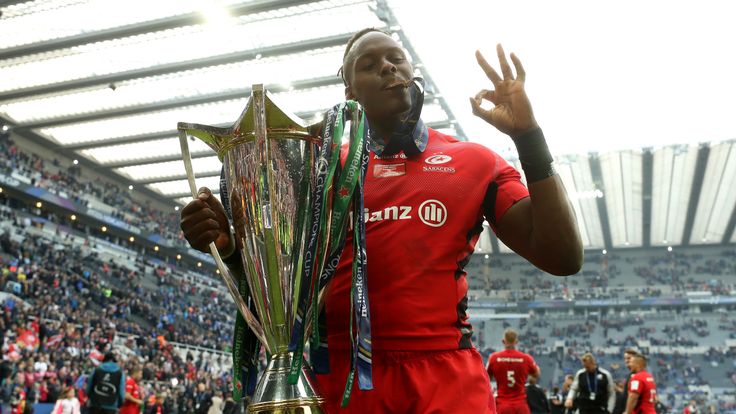
Monday 13 May 2019 14:18, UK
Saracens delivered when it mattered to secure a third European Champions Cup as we reflect on an enthralling final against Leinster.
The English club secured their first Champions Cup in 2016 with a 21-9 victory over Racing 92 and defended their title the following season with a 28-17 win against Clermont.
But their latest triumph feels extra special given it came against a superb Leinster side, the defending champions who travelled to Newcastle seeking to become the first side to claim five European titles.
We assess six key areas which paved the way to Saracens being crowed European champions for the third time.
Unrivalled squad depth
This was a powerful Saracens display on the big stage, and given how blunt Leinster were made to look as they tried everything to breach their opponents' defence, you were left wondering which other club in Europe could fare any better.
Saracens had of course suffered a triple blow having lost both props and conceded the opening try with Maro Itoje sent to the sin-bin after the half-hour mark - but Saracens director of rugby Mark McCall admits the reaction from his players even surpassed his expectations.
"I thought we went to a level in that second half, against a high-class team, that we haven't been at," he said.
Richard Barrington and Vincent Koch came in for the injured Titi Lamositele and Mako Vunipola to underline the squad depth and Saracens' disposal.
More than 40 players have represented them in the Heineken Champions Cup this season, and they can afford to allow many of their key men a week off against Worcester this weekend ahead of a home Premiership semi-final.
Vunipola returning to his best
Brad Barritt was officially named man of the match by the sponsors at St James' Park, but Billy Vunipola was the name on most people's lips as Saracens fans streamed back into town.
His performance in the semi-final against Munster suggested he was closing in on his best, and for England the hope is that he will peak at just the right time.
Where Leinster had shown a lack of tactical awareness and thinking on their feet, Vunipola sensed the opportunity with Scott Fardy in the sin-bin to decide the game.
For all of the number eight's brute force and footwork, it was his alert rugby brain, which allows him to divert from the game plan when needs be, that ultimately proved critical.
"I knew they were a man down, so I just thought I'd have a go," Vunipola said.
With Robbie Henshaw pulled inside in Fardy's absence, the man of the moment knew precisely what was needed at the scrum reset.
Goode's brilliance hard to ignore
Goode was named European Player of the Year in the aftermath of Saturday's win - and Saracens would not have claimed a third Champions Cup in four years without the 31-year-old.
The full-back saw off competition from fellow nominees Sean Cronin, Tadhg Furlong, Garry Ringrose and Mako Vunipola to win the accolade.
Goode beat 36 defenders during the competition - only bettered by Santiago Cordero of the Exeter Chiefs (38) and Toulouse's Cheslin Kolbe (52).
It must surely only be a matter of time before he adds to his 21 England caps after being repeatedly overlooked by Eddie Jones.
Leinster fail to take chances
Leo Cullen admitted it himself. "If you are going to win matches on this stage, you have to take your chances," he said following his side's defeat at St James' Park.
Leinster had started well and deserved their 10-point lead but having made 184 tackles and only conceded six penalties along the way, it was their decision-making that ultimately cost them.
Luke McGrath was perhaps the most culpable when he failed to find touch on the stroke of half-time having major repercussions, while Garry Ringrose failed to see a clear overlap in the 47th minute.
Saracens were clinical, the Irish province's drive for five derailed by a ruthless streak, but Cullen will call on his players to take on board the lessons from missing out a fifth star to come back stronger.
Cullen laments genetics
While McGrath's decision not to end the first half with Leinster leading 10-3 proved costly, it may have perhaps gone unnoticed that Saracens gained zero points from their first five trips to their opponent's 22. So it was far more than just one side being profligate that led to Saracens' eventual 10-point victory.
Leinster had possession of the ball for 23 minutes and 31 seconds, over four minutes more than their opponents, but they were continually faced with a brick wall.
Cullen added afterwards: "You see the size of Billy Vunipola, Maro Itoje and Will Skelton and we don't have access to too many players of that stature and they certainly did wear us down.
"You have seen it a number of times where Saracens grind teams down and it takes a toll on your squad and Saracens were the best team on the day.
"You know, it's genetics really, you can really only do so much about it."
Defensive masterclass holds key
Saracens' defence virtually won them the game, with only three Leinster players - Jack Conan (23), James Ryan (19) and Johnny Sexton (16) - making more than 15 tackles, compared with seven in a red shirt.
Remarkably, Mark McCall's side completed 207 tackles on Saturday - 12 more than they were forced to make during the semi-final against Munster and quarter-final against Glasgow Warriors combined.
Captain Brad Barritt led the way with 28 on his own, but there were two outstanding contributions that altered the destiny of the trophy.
Liam Williams' tackle on Garry Ringrose just as Leinster sought to reassert themselves saved a definite try, while George Kruis' hit on Johnny Sexton at 0-10 led to the penalty from which Owen Farrell got Saracens on the board.
"Winning the turnover just after half-time was big," the Saracens lock admitted himself. "We had a real mental boost before half-time and then right after it when we managed to win that turnover."
The England forward completed 27 tackles, and Kruis' intervention helped Saracens secure 59 turnovers during the tournament - no side achieved a higher number.
